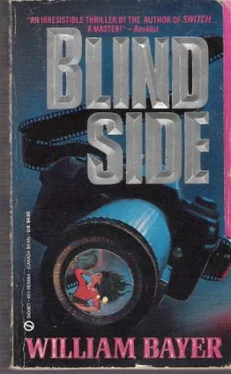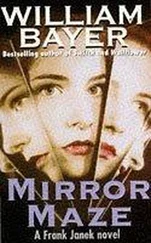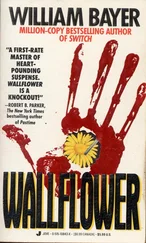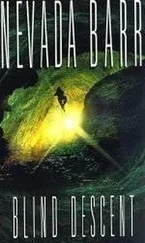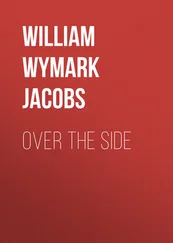William Bayer - Blind Side
Здесь есть возможность читать онлайн «William Bayer - Blind Side» весь текст электронной книги совершенно бесплатно (целиком полную версию без сокращений). В некоторых случаях можно слушать аудио, скачать через торрент в формате fb2 и присутствует краткое содержание. Жанр: Триллер, на английском языке. Описание произведения, (предисловие) а так же отзывы посетителей доступны на портале библиотеки ЛибКат.
- Название:Blind Side
- Автор:
- Жанр:
- Год:неизвестен
- ISBN:нет данных
- Рейтинг книги:4 / 5. Голосов: 1
-
Избранное:Добавить в избранное
- Отзывы:
-
Ваша оценка:
- 80
- 1
- 2
- 3
- 4
- 5
Blind Side: краткое содержание, описание и аннотация
Предлагаем к чтению аннотацию, описание, краткое содержание или предисловие (зависит от того, что написал сам автор книги «Blind Side»). Если вы не нашли необходимую информацию о книге — напишите в комментариях, мы постараемся отыскать её.
Blind Side — читать онлайн бесплатно полную книгу (весь текст) целиком
Ниже представлен текст книги, разбитый по страницам. Система сохранения места последней прочитанной страницы, позволяет с удобством читать онлайн бесплатно книгу «Blind Side», без необходимости каждый раз заново искать на чём Вы остановились. Поставьте закладку, и сможете в любой момент перейти на страницу, на которой закончили чтение.
Интервал:
Закладка:
"Hello?" It was a woman but it wasn't Kim. The voice sounded older, tougher, more working-class. I hesitated. If I asked for Kim I could scare her off.
"Sorry, wrong number," I said, then hung up.
It was Thursday. The Public Library was open late. I took a taxi to Sixth and Forty-second, stopped at a newsstand, bought a Post, then walked around toward the main entrance on Fifth. It was a hot August evening. People were milling about. A drug dealer whispered "Smoke, smoke" as I passed the entrance to Bryant Park.
The main reading room was filled with scholars. Homeless people too were dozing in the seats. I went to the far end where the out-of-town phone books were kept, found the Cleveland book, found a free seat at a table, and set to work.
I expected to spend hours, but I was lucky-I found the number in fifteen minutes.
Amos G 32231 W Loraine….. 734-3684
Amos: Could that be Kim's real last name? I went out to the corridor, found a pay phone, then used my telephone credit card to call Cleveland again.
"Hello?" It was the same woman.
"May I please speak to Mr. Amos?" I said.
A short pause.
"There is no Mr. Amos." And from her tone I gathered that if there ever had been one, she'd as soon not be reminded.
"Sorry," I said.
"Am I speaking to the lady of the house?"
"Who do you want to talk to, mister?"
"Mrs. Amos."
"No Mrs. Amos either. This is Ms. Amos. What do you want?"
"Very sorry, ma'am-I'm working here from a list."
"Selling something?"
"Yes, ma'am."
"Take my name off the list, and don't bother me again." She hung up.
At least I knew I had the right name.
Back home I thought about what I ought to do, whether I should drop the whole thing now, let Kim go. Now that there was a homicide involved, going after her would be a major step. If I did manage to track her down I just might land in a lot of trouble.
But Frank had been right when he'd told me I'd never be free of her until I found out who she really was. So, in fact, there was no choice. I had to go after her. I phoned American Airlines, booked a morning flight to Cleveland, then packed a bag. I took along my best Leica, three lenses and six rolls of TMX-400. Then I sat down with the Post to read the latest news on the Model Torture Slaying.
There wasn't much. Numerous police detectives from both New Jersey and Manhattan were working on the case, but so far no progress had been made. Meantime a designer I'd never heard of had given an exclusive interview to the Post, in which he said that Cheryl Devereux, known in the profession as Shadow, was as much of her time, the late 1980s, as the famous model Twiggy had been of hers.
I loaded The Big Sleep into my VCR and tried to lose myself in the plot. It wasn't hard, the story was labyrinthine. When I got to the scene where Bogart finds the blackmail camera hidden in the Oriental head, I remembered Kim's feeling that the blackmail material in the movie wasn't very strong. Which made me think, in turn, of people who "don't pay money to sleazebag crook photographers." What new threat, I wondered, did they now have in store for me?
After checking in at La Guardia, I phoned Aaron Greene to ask how he was doing tracking the Pentax guy. He said he was still working on it and he'd let me know. Then I flew to Cleveland.
What can I say about that rust-belt town? From a purely photographic point of view I found it fascinating.
The very qualities that once made it a talk-show joke were the traits that spoke to me.
The air, for instance. It was thick and smoky. Even driving out of the airport in my rented car, I felt oppressed by haze and stickiness. But I've always liked that kind of oppression. It gives a special quality to light. And the light in Cleveland was extraordinary. All those shimmering particles of industrial waste, catching the sunlight, made the city seem to burn.
I liked the hard look of the people too, the ones I saw outside the plants and mills: men whose eyes were devoid of mercy; young blacks with scornful mouths. And the mills themselves intrigued me, the way they were clustered along the Cuyahoga flats. Here a hundred chimneys spewed out smoke, each trail its own shade of gray or brown. These trails hung in the windless air and were reflected in the molten river. Beyond lay Lake Erie, its steel-gray surface reflecting nothing, a hard, still, clouded mirror.
I'd bought a city map at the airport. The Hertz girl had marked it up for me, the block where G. Amos lived, and the location of a nearby motel. I found the motel first, a stark two-deck sickly green box, fifteen units to a deck. A sign out front identified it as THE DEVORA. When I drove up, a pale old man in an undershirt was trying to mow the lawn.
Inside the office, I was caught in a cross fire between two electric fans. The clerk, a teenage boy with a bad case of acne, explained that the air conditioning was out.
"But we expect it on by tonight," he assured me. Meantime the nightly rate was twenty-six dollars. The place was dismal, but my finances weren't in the best shape, so I signed the register, got my key, brought my car around to my door, and moved in.
The word "depressing" merely begins to describe my room. The air was stale and muggy, the rug was worn through on either side of the bed, and the bed itself was covered by a thin gray bedspread textured with even grayer ribs. The only wall decoration was an old Eastern Airlines calendar. The TV set, bolted to its table, wore a film of dust. The easy chair was cracked. The closet wasn't deep enough to hold my jacket. In the bathroom the shower curtain was ripped, the stall smelled dank, and the toilet coughed like a dying fish.
It was awful, but I almost liked it, perhaps because it suited the way I felt, bespoke being on the run and down and out. The'Devora motel was a place where the terrible people who wanted me blind would never find me. Here, for a time, I would be safe.
I changed my shirt, then went out to my car. I was on the south side of the city, on the edge of a working-class area of Poles and Greeks. I drove around for a while, slowly, absorbing the feel of the place. Then I went to a supermarket, bought an egg salad sandwich, got back in my car, drove until I found a grade school, parked across the street, and ate.
Though it was summer and school was out, the playground was crowded with kids. I tried to imagine Kimberly Amos, if indeed that was her name, playing here too when she was a girl. I imagined her skipping rope in this schoolyard, or striding up and down the corridors inside. I even had a vision of her furrowing her brow, worrying over a word on a spelling quiz.
I found the Amos house, circled the block several times, then parked inconspicuously across the street. I arranged my car so that I could watch the door through my adjusted rearview mirror.
It was an ordinary house among other ordinary frame houses, each with a small lawn in front and a narrow driveway leading to a detached garage in back. The houses varied in state of upkeep and each had its own distinctive feature-a lar er than ordinary TV antenna on one, a has, t above the garage door of another. the Amos house, a lack of movement best, and the fact that all the downstairs windows were shut, told me nobody was home. So I just sat in my car absorbing the sounds and sights of the neighborhood, willing myself inconspicuous.
Occasionally a child appeared, riding a bike, or carrying a baseball glove and bat, moving toward the school. Several times I saw women leave their homes, get into cars, drive off and then return with bags of groceries. At 3:30 a UPS truck appeared, and slowly worked the block.
en a patrol car drove by; I didn't pay any attention to it, just buried myself in my newspaper like a man waiting patiently for his wife.
Читать дальшеИнтервал:
Закладка:
Похожие книги на «Blind Side»
Представляем Вашему вниманию похожие книги на «Blind Side» списком для выбора. Мы отобрали схожую по названию и смыслу литературу в надежде предоставить читателям больше вариантов отыскать новые, интересные, ещё непрочитанные произведения.
Обсуждение, отзывы о книге «Blind Side» и просто собственные мнения читателей. Оставьте ваши комментарии, напишите, что Вы думаете о произведении, его смысле или главных героях. Укажите что конкретно понравилось, а что нет, и почему Вы так считаете.
